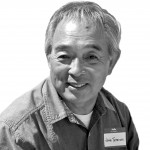One of the best memories I have of my early life was the time I spent with my grandfather in Manzanar. I was the youngest of four boys in my family, and our ojichan had gone to Manzanar with us when we were forced to leave Los Angeles. He moved into our barracks unit, such as it was with planks for floors (the government hadn’t even bothered to lay down carpets for us!), no furniture and walls that let the sunlight (and dust) in through the cracks.
My father had been taken away early in our imprisonment at Manzanar, and I think I must have felt the need for an adult male figure and so gravitated to my grandfather.
In much the way my dog follows me around the house now, I think I was like that with my grandfather because everywhere he went, I was right there with him. Those were my formative years, and I’m sure my insecurities were glaring, having been uprooted from the only place I’d known and then being separated from my parents for a time before rejoining them in Manzanar, only to see my father later taken away and us as a family shattered and scared.
But my grandfather was there, and I’m sure he gave my mother some comfort that things would be OK, that we would be OK as a family. I never really talked to my brothers about that day, and it occurs to me as I write this that it’s strange we never did. It must have been like those frightful feelings kids have when terrible things happen to the adults in their lives and they, the kids, have absolutely no control or understanding of what’s happening.
My emotional safety net was my grandfather. In many ways, he became father and mother to me. I rearranged the cots in our barracks one day when no one was there so that my bunk was next to his, and I don’t remember anyone saying anything to me about that. And as much as I followed him around, he did things for me, like getting up in the middle of cold winter nights to help me get my boots and jacket on and accompanying me to the latrine, or warming my clothes on the potbelly stove on cold winter mornings before I put them on, or giving me a dakko when the rains came and the walkways were muddy, and a thousand other little things. Even in the awfulness of being imprisoned, he did his share of spoiling me in the way grandparents do.
For some reason, my grandfather had a pass to leave the camp every day. I never really understood what it was for, but one of my brothers told me once that he was a watchman of a dam at a nearby creek, George’s Creek. I don’t remember any kind of dam there, and he wouldn’t have made much of a watchman. Besides, how do you watch over a dam?
But every morning, he would walk out the back gate of the camp and trek across the desert to the creek. And I would be with him. For the most part, he was a quiet, contemplative man, but I remember having conversations with him out there in the desert, asking questions about things that had no answers because he always seemed so infinitely wise to me and I must have figured that if anyone would know, it would be he. I remember one time asking him one of those ‘what is the meaning of life’ questions. He sat me down, handed me a piece of driftwood he had rubbed smooth, and told me to study that piece of wood and he would come back to get me when I figured it out.
Well, I can tell you that a 5- or 6-year-old kid in the desert ain’t gonna figure anything out! I sat there for what was probably a pretty short while before I got bored and started chasing lizards and throwing rocks. But when I saw my grandfather coming back, I sat down dutifully as if I were contemplating the piece of wood. I had no answer for him, so he left me again. A few times of this and I’d had enough, so the next time he returned I told him I understood everything! And we continued on to the creek and his place, a little hut he had built out of branches where we would spend our days by the creek.
After the war, I continued to live with my grandfather, sharing a bedroom with him, loving those times when we would lay in the dark talking before I fell asleep, taking little excursions to the merry-go-round at Santa Monica Pier every Sunday or spending four or five days together going up to Sacramento in his old Model A to attend the California State Fair. As our lives got further away from Manzanar, we still had those long conversations, only now we’d go down to the beach and sit for hours or up to the mountains. He talked, I listened.
Over the years, the lessons he taught me about life stuck with me. My father taught me about justice and principle and integrity, but the lessons my grandfather taught me are still as much a part of who I am today, and I hope the person I’ve become is half as wise as he was.
John Tateishi is a former JACL national director.
Originally published on April 18, 2014




